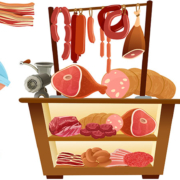Chronic Kidney Disease Again Linked to High Consumption of Red Meat
Chronic kidney disease (CKD) is more likely to develop in individuals who have a high intake of total red and processed red meat, according to investigators.
A study of 4881 participants in the Tehran Lipid and Glucose Study found that, compared with patients in the lowest quartile of total red meat consumption, those in the highest quartile had 73% increased odds of CKD, after adjusting for age, sex, smoking, diabetes, hypertension, and other potential confounders, Parvin Mirmiran, PhD, of the Shahid Beheshti University of Medical Sciences in Tehran, Iran, and colleagues reported in the Journal of Renal Nutrition. Patients in the highest quartile of processed red meat intake had significant 99% increased odds of CKD. The investigators found no significant association between consumption of unprocessed red meat and CKD risk.
Each 1 serving per day increase in total red meat and processed red meat was associated with significant 15% and 28% increased odds of CKD, respectively. In substitution analyses, replacing 1 serving of total red meat and processed red meat with 1 serving of low-fat dairy, nuts, whole grains, and legumes was associated with a decreased risk of CKD, according to the investigators.
Study participants had a mean age of 40.1 years and normal kidney function at baseline; 47% were women. The investigators defined CKD as an estimated glomerular filtration rate below 60 mL/min/1.73 m2 calculated using the Modification of Diet in Renal Disease study equation.
The investigators offered some potential mechanisms by which dietary red meat could adversely impact renal function. Higher dietary intake of meat generally results in greater dietary acid load, which is associated with higher CKD risk, they noted. In addition, the high content of advanced glycation end products in cooked red meat can have adverse effects on kidney function.
With respect to study limitations, Dr Mirmiran and colleagues noted that, like in most epidemiologic studies, their definition of CKD is based on a limited number of isolated creatinine measurements that were not repeated within 3 months to confirm a chronic reduction in eGFR.
The new findings build upon previous investigations showing a link between meat consumption and CKD risk. For example, a study of 11,952 participants aged 44 to 66 years in the Atherosclerosis Risk in Communities study showed that the highest quintile of red meat intake was associated with a significant 19% increased risk of CKD compared with those in the first quintile, after adjusting for potential confounders, Bernhard Haring, MD, MPH, and colleagues reported in a 2017 article in the Journal of Renal Nutrition. The highest quintile of red and processed meat consumption was associated with a significant 23% increased risk. The study found no significant association between processed meat intake by itself and CKD risk.
References
Mirmiran P, Yuzbashian E, Aghayan M, et al. A prospective study of dietary meat intake and risk of incident chronic kidney disease. J Ren Nutr. 2019. doi: 10.1053/j.jrn.2019.06.008
Haring B, Selvin E, Liang M, et al. Dietary protein sources and risk for incident chronic kidney disease: Results from the Atherosclerosis Risk in Communities (ARIC) study. J Ren Nutr. 2017. doi: 10.1053/j.jrn.2016.11.004
Newswriter: Jody A. Charnow | Renal and Urology News

